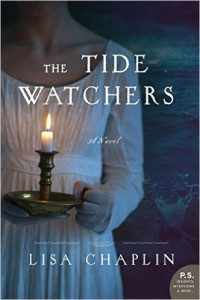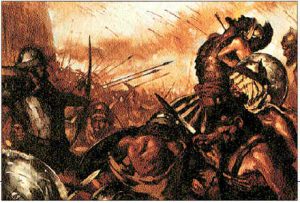 My guest today is Lisa Chaplin, author of The Tide Watchers. Lisa is a former nurse, wife and mother of three who has sold more than 1.6 million books worldwide with 20 published romance and historical fiction novels. The Tide Watchers was her first published historical fiction, published across the English-speaking world by HarperCollins. Her next historical fiction is Incomparable Shadows, a real Scarlet Pimpernel novella, and “The Memory of Cardamom” series, about the young prophetess forced to marry the king who murdered her husband. Her agent is Eleanor Jackson of Dunow, Carlson and Lerner Literary Agency in New York. You can connect with Lisa via her website, Twitter and Facebook.
My guest today is Lisa Chaplin, author of The Tide Watchers. Lisa is a former nurse, wife and mother of three who has sold more than 1.6 million books worldwide with 20 published romance and historical fiction novels. The Tide Watchers was her first published historical fiction, published across the English-speaking world by HarperCollins. Her next historical fiction is Incomparable Shadows, a real Scarlet Pimpernel novella, and “The Memory of Cardamom” series, about the young prophetess forced to marry the king who murdered her husband. Her agent is Eleanor Jackson of Dunow, Carlson and Lerner Literary Agency in New York. You can connect with Lisa via her website, Twitter and Facebook.
What or who inspired you to first write? Which authors have influenced you?
Although I always made up stories as a child, I never took it seriously until my husband talked me into trying when I was raising the children. I loved it from the first (terrible) page I wrote. I’ve loved many authors through the years. I’ve found Markus Zusak, Sharon Penman, Jane Austen, Elizabeth Chadwick, Jodi Picoult, Suzanne Collins and Veronica Roth all inspiring in various ways.
What is the inspiration for your current book? Is there a particular theme you wished to explore?
 For the novella I’m about to self-publish, I read an article about the real-life Scarlet Pimpernel, and discovered he was actually in the area my characters from The Tide Watchers were in pre-war 1803. I had to investigate – and when I discovered he was in Boulogne-sur-Mer during the time Napoleon launched his secret invasion fleet, the story of Incomparable Shadows, my Tide Watchers’ novella, was born.
For the novella I’m about to self-publish, I read an article about the real-life Scarlet Pimpernel, and discovered he was actually in the area my characters from The Tide Watchers were in pre-war 1803. I had to investigate – and when I discovered he was in Boulogne-sur-Mer during the time Napoleon launched his secret invasion fleet, the story of Incomparable Shadows, my Tide Watchers’ novella, was born.
My current big work in progress (discussed below) has just gone through my agent’s suggested revisions, and we’re shopping it.
What period of history particularly inspires or interests you? Why?
For me it’s less a special time period in particular than the stories hidden beneath the accepted “facts”. I’ve written stories from the hidden history of Bathsheba, King David’s final queen and the mother of Solomon, to the unknown British spies that had to find and sabotage Napoleon’s most secret invasion fleet, using only a hand-cranked submarine and a drill, to the real Scarlet Pimpernel and his trusted team finding the time and way to give those spies a signal to go.
What resources do you use to research your book? How long did it take to finish the novel?
I use the net to start, and order the books I need, and take notes. I use these as the foundation for my “pitch” that I use both to pitch my book to my agent or to editors I meet, and for the centre of my visual synopsis/timeline for my book, starting with known facts of the time, and correlating it in colour-coded order to each of my characters. I always try to visit as many of my settings as possible. My HarperCollins editor said she knew she’d buy the book when she felt as if she really walked in the Channel Coast of France, 1803. I was lucky enough to live in Europe for 4 years, and that knowledge of the land, animals, people, customs and seasons made the difference.
What do you do if stuck for a word or a phrase?
That’s not something I worry about. I’ll stick what I want to say there in parentheses, and go on. Most times, it comes back later – sometimes in the middle of the night! I keep a notepad beside me in that case.
Is there anything unusual or even quirky that you would like to share about your writing?
Well, I don’t know if it’s normal or not, but once I’ve done all my prep work, I ‘hear’ my characters – mostly at night. It leaves me quite sleep-deprived at times, as I often have to get up and write it before I lose it; but it works for me. I find using a unique scent and soundtrack for each story also quite inspiring.
Do you use a program like Scrivener to create your novel? Do you ever write in long hand?
I’ve never tried Scrivener. I’ve often thought I will buy it for the next book, but I just start in Word, and off I go. I do my prep work in longhand, and my visual synopsis on a sheet of cardboard, which I then put in front of me on the wall, along with notes and pictures about the time period.
Is there a particular photo or piece of art that strikes a chord with you? Why?
I take a ton of photos on every research trip, and make a rolling scroll on my iPad which I keep beside me as I write. My latest two are of the City of David in Jerusalem, and the wilderness of the En-Gedi, beside the Dead Sea. I have the same with my Napoleonic Walking Tour in Paris, and in Boulogne-sur-Mer on the French Channel Coast.
One painting I do refer to often is ‘the Death of Uriah’. This keeps his betrayal fresh in my mind.

What advice would you give an aspiring author?
Don’t settle! If you have a big story in your mind, do your apprenticeship with courses, short stories or whatever, certainly, but don’t think a sale in a perceived easier genre of fiction will make it easier for you to sell the big historical fiction later. In my experience as a romance-to-historical author, my publishing credits only made my entrée into historical fiction all that much harder. Go for the big story, do as many courses and conferences as you need to serve your writing apprenticeship well, but never, never settle. Dream big, make the story bigger, and write it with all your heart and soul.
Tell us about your next book.
My current work in progress is the second in “The Memory of Cardamom” series. It’s a three-book series about Bathsheba, the last wife of King David and the mother of King Solomon. It’s not the time-worn “grand passion” that created adultery and murder. I asked myself the question, how would I feel if I truly loved my first husband, and was forced into a king’s bed, then forced to become his wife? Could I ever love my beloved husband’s murderer?
And, from David’s point of view: what made this one young woman so special that I’d risk my throne, my nation, my relationship with God and three of the best friends I’d ever had, just to have sex with her? Was it just sex with a beautiful girl? How could it be, when she was the granddaughter of my counsellor, the daughter and wife of two of my Mighty Men, men who’d saved my life?

In the winter of 1803, one woman stands between Napoleon and the fall of Great Britain.
The free-spirited daughter of an English baronet, Lisbeth defies convention by eloping to France. When her husband abandons her, she must find a way to survive and be reunited with her young son, who is in the care of her mother-in-law.
A seasoned spy known as Tidewatcher, Duncan apprenticed under Lisbeth’s father and pledged to keep his mentor’s pretty daughter safe—a promise complicated by the wily Napoleon Bonaparte. The British believe he is planning an attack, and Duncan is sent to search for signs of invasion on the French coast—where he draws dangerously close to adventurous and unpredictable Lisbeth.
A sensational new invention may shift the tide of a French victory. A brilliant and eccentric American inventor named Robert Fulton has devised a deadly weapon that can decimate an enemy’s fleet. To protect English ships, Tidewatcher must gain control of Fulton’s invention and cross enemy lines . . . but he cannot do it alone. Left with no other options, he enlists Lisbeth’s help in outwitting the American inventor and uncovering Bonaparte’s secret plans.
Going undercover for the handsome and duty-bound spy, Lisbeth risks her freedom and her life as she navigates double agents and submarine warfare to outwit the greatest military tactician in history. The only question is . . . who can she trust?
The Tide Watchers is available via Harper Collins Australia or Amazon US.
Thanks so much for giving us an insight into your ancient world series, Lisa. And delving into the world of the real Scarlett Pimpernel sounds intriguing, too!



Interesting that Lisa researches much the same way I do for time travel novels, read other book and go there when you can afford to. I’m putting her book on my “to read list.”
Hi, Connie – I do beg your pardon for my tardiness, I’ve been lost in my upcoming Sydney Writers’ Festival talk Saturday – nervous as a kitten! Thank you, and I hope you enjoy The Tide Watchers.
Lisa
Thank you for this interesting “behind the scenes” look at what goes in to writing historical works. These books are going on my wish list.
I’m so glad you connected with my post, Daniele. the Tide Watchers is available at most bookstores (if not, please order it!), and Incomparable Shadows will be on amazon.com very soon!
Lisa
Very interesting interview. I’ve not read Ms. Chaplin’s books – but have added them to my TBR. Thanks for sharing.
Thanks so much, Nancy. I hope you enjoy The Tide Watchers!
Lisa
Research it when insert the reader fully into the story, and this looks good
That’s exactly what I hope for, Andrea – to immerse the reader into the world, rather than give mini-lectures. I hope I managed it. :-))
Lisa
After reading this I am definitely very excited to read the Tide Watchers!
Thanks so much, Mikayla. Love the way you spell your name! I hope you enjoy The Tide Watchers.
Lisa
I loved reading Lisa’s approach to researching her stories. Can’t wait to read The Tide Watchers and the series she is currently working on.
Thank you so much, Diane! I always feel like such a crazy geek doing the things I do for research – but I love it.
Incomparable Shadows should be on Amazon by the end of July, I hope. The Tide Watchers should be at all good bookstores, and online.
Lisa
I’ve been wanting to read Lisa’s The Tide Watchers. I love when a book takes you to another place.
I’m so glad, Sharon. I hope you enjoy The Tide Watchers.
Lisa
I love the Napoleonic era. It’s interesting to me that you take pictures or look at paintings of the theme or era of the book that you’re writing as you write it. When I’m READING a book from a certain era, I like to listen to music from that time and look at pictures or paintings from that time; it helps to make me feel as though I’m THERE…..Your ancient world series sounds interesting also. I like that you try to think how the characters may have felt and why they did what they did.
I can’t help it, Gail – my mother was a child-abuse counsellor from the time I was 18, and I had years of talk about why people do as they do. More bizarre than fiction at times!
I find pictures, maps, music and scent transports me. I need that with a husband and two kids still at home. :-))
Sounds like a wonderful story. Ive always been a fan of the Scarlet Pimpernel.
One of the things that I relish about history (virtually any location or era!) is the fact that there are always true stories and facts within the broad strokes that are frequently more engrossing than those we were taught were the major actions!
Me too! Accepted history is almost always written by the victors – which is why I go to the places it happened, to see what the locals know, as well as the land, customs etc. It’s basically “the sound of silence”. So few know of the small acts that changed the course of history, especially from the perspective of the losing side, or those who changed the history – not the kings or generals, but the spies on both sides, and the soldiers and the local people where battles took place.
I think this sounds interesting. There are just some people you love to hear others getting the better of. Thanks for this opportunity.
Thank you, Nancy! I hope you’ll find The Tide Watchers if you don’t win the contest.
Lisa
I really enjoyed the article and I am definitely going to read her books. Great way to look for grand characters and themes that readers have not heard about.
Thanks so much, Marcie! I’m definitely not an “accepted history” girl. I love finding the story that fell beneath the cracks, told by those no one knows about, or that history has misjudged.
Lisa
Very interesting interview!
Glad you enjoyed it, Ola!
Lisa
Enjoyed reading the interview. The book sounds like one I would enjoy reading.
I glad you enjoyed it, Jackie, and hope you enjoy The Tide Watchers.
Lisa
I like her sources of inspiration – from Jane Austen to Jodi Picoult. This sounds like a good read!
Teehee! I’ve been a mad reader from the age of five, and read widely. I’ve also found that inspiration comes from unexpected sources. Just last week, my son wanted me to watch Rogue One with him, anda Star Wars filler movie inspired me to work on the structure of Incomparable Shadows.
Fantastic interview! Your book sounds amazing.
Thanks for this…”Go for the big story, do as many courses and conferences as you need to serve your writing apprenticeship well, but never, never settle. Dream big, make the story bigger, and write it with all your heart and soul.”
I needed to hear this. I’ve had many ideas and false starts, but my most recent idea…MY big story…I’ve been having second thoughts. Not after reading this. Thank you!
You are so welcome, Michelle. Don’t settle! I felt unworthy of my big story for years, and so, though it came close to selling, it never did. I’ve wasted so many years waiting to be ready, instead of making myself grow. You can do it!
Let me know how it goes, please? I’d love to hear. contactlisachaplin@gmail.com
Lisa
Such a fascinating period in history.
It certainly fascinates me, Mary. As I said before, I love to find the untold stories rather than a new take on a well-worn path.
This is why I adore history. So many gaps – you can always find someone’s story if you look hard enough.
Lisa
I am always looking for new authors to read. Your book sounds interesting.
I like reading about historical situations.
I hope I can be one of your new authors, Joye. I love history, and The Tide Watchers combines real historical characters with the fictional ones – but even the fictional ones are people that had to be there and to have done what happened. Or something very close to it!
Lisa
I enjoyed the interview. I liked how she said using a unique scent and soundtrack for each story was inspiring
Thanks so much, Vicki. With three kids, a husband and mother – all of whom thought writing was my interruptible hobby, I needed to create my process to get any work done at all. Best part of it is, it’s portable. I can go anywhere and take it with me.
Lisa
This looks so interesting! And Ms. Chaplains list of inspirational authors definitely makes me want to read her book.
You love those authors too? They can drag me in until I forget time and space. I’m right there with those characters. It’s been that way for me since I first read Little Women. :-)))
Lisa
I like Lisa’s tip about how to deal with the dreaded “I can’t find the right word to use here moments.” I’ll have to give that a try….thanks!
What a great interview!